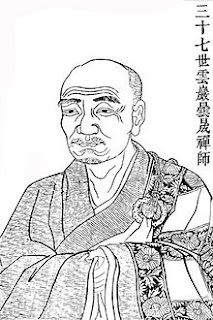Daowu Yuanjie and his disciple,
Jianyuan Zhongxing, went to visit a family who were mourning the death of one
its members.
The coffin was still at the
house, and Jianyuan took the opportunity to ask his master a question.
Laying his hand on the coffin he asked, “Is
he alive or dead?”
“I won’t say alive,” Daowu told
him. “I won’t say dead.”
“Why not?”
“I won’t say.”
After the visit, as they were
returning to the monastery, Jianyuan was very disturbed and demanded, “Tell me,
alive or dead. If not, I’ll strike you
down!”
“Strike me or not, I still won’t
tell you.”
Jianyuan was unable to restrain
himself, and he struck his master. Daowu
did not strike back, but it was such a breach of etiquette that he told his
student, “If others learn what you’ve done, it may cause you trouble. So it would better if you leave our monastery
for a while.”
Jianyuan wandered from place to
place until he learned that his former master had died. Then he returned to the monastery where Shishuang
Chuyuan was now teaching. Jianyuan
explained why he had been absent from the monastery for so long and told the
new master about the question to which Daowu had merely said: “I won’t say
alive; I won’t say dead.”
“Can you answer my question?” he
asked Shishuang.
“I won’t say alive; I won’t say
dead,” Shishuang replied.
“But why not?” Jianyuan asked.
“I won’t say.”
And with those words, Jianyuan
finally came to awakening.
[Jianyuan Zhongxing – Zen Masters of China: 120-22]
 Chunzi Decheng, Daowu Yuanjie,
and Yunyan Tansheng all received Dharma transmission from Yaoshan Weiyan.
Chunzi said to the other two: “I know that both of you will eventually go your
separate ways and continue our master’s Dharma.
That isn’t my path; I lack that discipline. I enjoy nature and will follow my own
way. I’m not fit to be the teacher of a
great assembly. Still, if an appropriate
student comes to you, please send him to me so that I may repay our teacher by
passing on what little I’ve learned.”
Chunzi Decheng, Daowu Yuanjie,
and Yunyan Tansheng all received Dharma transmission from Yaoshan Weiyan.
Chunzi said to the other two: “I know that both of you will eventually go your
separate ways and continue our master’s Dharma.
That isn’t my path; I lack that discipline. I enjoy nature and will follow my own
way. I’m not fit to be the teacher of a
great assembly. Still, if an appropriate
student comes to you, please send him to me so that I may repay our teacher by
passing on what little I’ve learned.”

